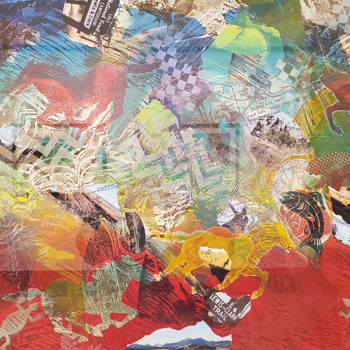Does the revolution start in our rooms?

When I was 14, I was first made aware of what happened to the women who were protesting in Egypt in the 2011 revolution. That, in the aftermath of the unity that was created amongst all those protesting in the square at the time, there were reports of how communal the square was. The consequential crackdown resulted in the manufacturing of prostitution allegations against all the women that were in the square.Egypt, my home country, and place of birth is classified as one of the top 10 worst countries for women in the world. Topping most charts accounting for violence, gender-based and sexual violence against women, human rights abuses, lack of fundamental freedoms and rights, that is. As an anthropologist, I know not to center statistics and data as metrics to indicate social phenomena. But, as a woman who has lived with the constant fear, agony, and anger at a state that finds ways to harmonize between its bloody past and its current reproductive and family planning initiatives, it becomes comical to decipher the directions and agendas of this state.
One of my earliest memories about my journey in formulating my political and social ideologies in lieu of living in one of the most politically charged and dangerous countries in the world, was sitting through a presentation about the virginity tests that were instated and performed for the women that participated in the 2011 revolution.
If asked, I reckon that 99.9%, albeit 100% of women will contend that their personalities are concealed, reversed, reconfigured, and altered in a way that is adversary to how they identify themselves in the daily. What does this concealment serve? Or who does it serve? In Egypt, it serves the state and society. Ideally, this reworking of one’s personality is a mechanism to survive and live through a system that is carefully curated to subjugate women, gender non-conforming individuals and non-normative communities. While this is true in terms of analyzing the global hegemonic order for living and existence, this is especially true for women and queer communities within such contexts.
The pervasiveness of culture, religion, state, tradition, and such, all produce “women” as subjects whose personalities are socially manufactured, concealed, and conditioned in an artificial way, to say the least. This artificialness is only productive for survival within the confines of the social and this concealment serves to produce obedient subjects for the state. For women, this formation of a subject includes creating an obedient, socially abiding citizen who is utilized for the social and biological reproduction of the state and of the respective society. So, anything that abject with this goal, must be almost completely concealed. This does not become the core of the issue nor is it a point of contestation. Can a society that has glorified the category of manhood at the expense of inflicting severe discrimination and violence against women even address the reconstruction of those categories to dismantle a binary that operates through oppression and repression and does not promise liberation in any sense? Gender is undoubtedly a performance that we are socialized and made to perform as part of formalizing and constituting our identities. We perform our genders as a means of comporting ourselves in society. Such performativity is essentially fluid in its conception, however in its execution, we observe how it is constructed externally from how we define ourselves to be and how the social and political powers that dictate our identities play a prominent role in how we can perform as such. Equivocally, being a woman is a performance. It is an identity category that one must perform. It is not natural, biological, scientific, and shouldn’t be normalized or taken as such. Womanhood is a social and political process of reclamation and of power. It’s biological but not necessarily so. It’s arbitrary. The binary man/woman is politically constructed through certain power differentials that allow for some to exist freely whilst others must be defaced considering the patriarchy. The construction of woman throughout the gender narrative has been granted a negative connotation that has been unjustly justified through the objectification of science and of scientific discourse that ultimately denies positive images to the bodies of women. This category is a socially constructed ideation that has been materialized through recognizing the biological body as the central form of identification. So, what is essentially a woman? I would claim this category as one that should be claimed by the beholder not assigned as part of one’s identity. There are various ways to claim and inhabit this category and dismissing ways that are not “biological” is reductionist, transphobic, and homophobic to say the least. A woman is a woman in the relations that she creates and in the power that she reclaims.
Another fundamental question here, is how we can imagine the construction of identities beyond just the relegation of sex and gender as the main indicators for such personalities. Employing a revolutionary sensibility and “horizon” in understanding sex and gender and feminist theory generally, may allow us room to identify how the concealment of identities is used as a survival mechanism in the public to conform within the system. Open expressions of sexuality may deliver the inherent radical promise of transforming social relations and transforming the ways by which feminism can counter the systems that are in place. It is, thus, essential to think through what this revolutionary sensibility means in the wake of the socially, gendered, classed, and raced society that we live within. Does this revolutionary sensibility have to be in the form of large social movements through streets and calling for reformative justice? For women in the Arab region, this revolutionary sensibility is about the everyday practice of breaking through norms and ideations of what their identities need to look like. Social emancipation or revolutionary change does not and for most cannot start in the grand and capital R revolution. But the revolution starts when we are getting ready in the morning, contemplating for the 50th time that morning whether we will hide our bodies or embrace some parts of them in just the slim hope that we’re not bothered by it, whether we will show our body hair or not, whether we will conform to social femininity or define it for ourselves/denounce it altogether. The revolution starts when we stand up for ourselves and for those that the system does not and will not protect. It starts when we identify those parts of our identities that threaten the system and flaunt them shamelessly. The revolution starts in our rooms and someday it’ll make it to the hall.





